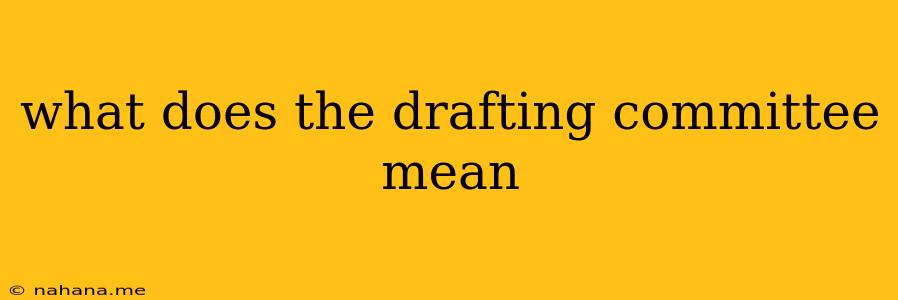What Does the Drafting Committee Mean?
A drafting committee is a group of individuals responsible for creating or revising a formal document, such as a law, regulation, policy, or agreement. They take input from various stakeholders and transform it into a comprehensive, coherent, and legally sound document.
The Role of a Drafting Committee
The drafting committee's primary role is to:
- Gather information: They collect input from subject matter experts, stakeholders, and relevant parties to understand the document's purpose, scope, and intended outcomes.
- Develop a draft: They craft the initial version of the document, ensuring clarity, consistency, and legal accuracy.
- Revise and refine: The committee works iteratively, reviewing and refining the document based on feedback from stakeholders and internal review processes.
- Seek approval: Once the document is finalized, the committee submits it to the relevant decision-making body for approval.
Key Characteristics of a Drafting Committee
- Expertise: The committee members possess the necessary knowledge, skills, and experience in the subject matter of the document.
- Collaboration: The committee fosters a collaborative environment where diverse perspectives are valued and considered.
- Communication: The committee communicates effectively with stakeholders throughout the drafting process.
- Objectivity: The committee maintains objectivity and avoids bias in their drafting decisions.
Importance of a Drafting Committee
Having a dedicated drafting committee ensures that the document is:
- Comprehensive: Addresses all relevant aspects and considerations.
- Clear and concise: Easy to understand and interpret.
- Legally sound: Complies with applicable laws and regulations.
- Aligned with stakeholders' needs: Reflects the input and concerns of all parties involved.
Examples of Drafting Committees
Drafting committees are used in a variety of contexts, including:
- Legislative bodies: Drafting bills and amendments to existing laws.
- Government agencies: Developing regulations and policies.
- Non-profit organizations: Creating bylaws, mission statements, and policies.
- Businesses: Establishing contracts, agreements, and internal policies.
In conclusion, a drafting committee plays a crucial role in the creation and revision of important documents. Their expertise, collaborative approach, and commitment to clarity and accuracy ensure the document serves its intended purpose effectively.
